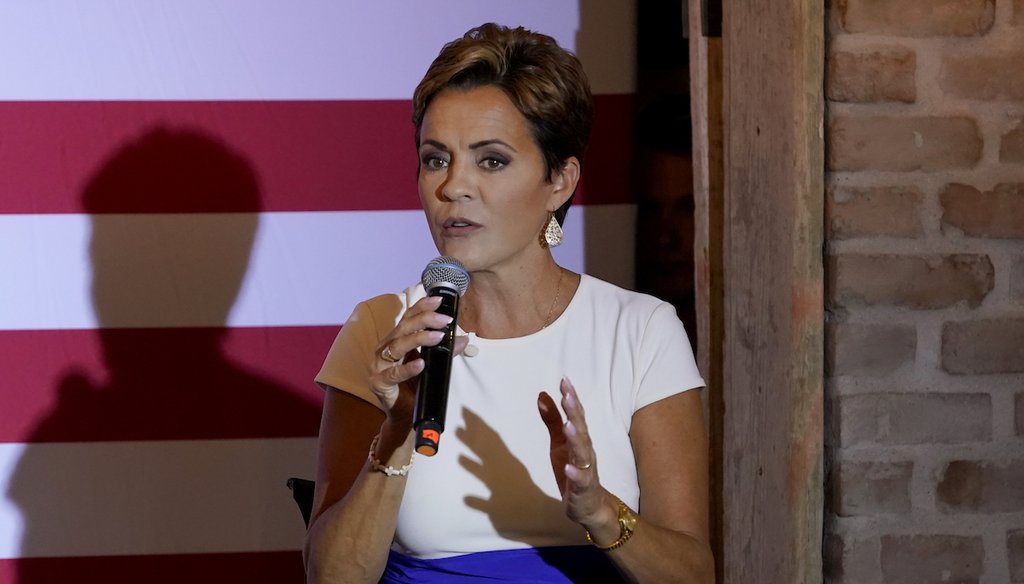Get PolitiFact in your inbox.

Arizona Republican gubernatorial candidate Kari Lake speaks at a rally Sept. 20, 2022 in Chandler, Ariz. (AP)
Arizona GOP governor candidate Kari Lake misleads on opponent’s abortion law vote
If Your Time is short
-
An Arizona law requires doctors to provide life-saving care to babies that survive an abortion, unless they determine there is no chance of survival.
-
Democratic gubernatorial candidate Katie Hobbs opposed the bill in 2017.
-
The bill’s passage had no effect on the legal or ethical requirement for doctors to provide care for infants that survive an abortion.
In the close race for Arizona’s governorship, Republican candidate Kari Lake said her opponent holds an extreme position on abortion legality.
In an interview on CBS News’ "Face the Nation," Lake said that Democrat Katie Hobbs supports medical cruelty toward infants.
"Katie Hobbs, my opponent, actually has voted for allowing a baby who survives an abortion, that the hospital would refuse medical care and allow the baby to die on a cold metal tray," Lake said Oct. 9.
Hobbs countered that Lake was "entirely misconstruing" her position.
Here, we dig into the details of the bill and Hobbs’ vote.
The law
As a state senator in 2017, Hobbs voted against a bill that required a physician to use "all available means and medical skills … to promote, preserve and maintain the life" if a baby emerges alive from an abortion.
Hobbs was one of 11 senators voting against the bill. It passed 18-11 and became law.
The legislation gave doctors the flexibility to curtail treatment if they determined that the only result would be to "prolong the act of dying."
But Lake’s suggestion that Hobbs’ vote against this bill meant that she supported intentionally letting a baby die is inaccurate. Laws were already in place that made such actions illegal.
Alexander Capron, professor of medicine and law at the University of Southern California, said that with or without the Arizona law, doctors would provide care to a baby.
"All live-born children — whether following a normal labor and delivery, a miscarriage or an abortion — is owed a duty of care by the attending physician that would include all reasonable measures to preserve the baby’s life and maximize its prospects for a healthy life," Capron said.
No law legalizes leaving a "baby to die on a cold metal tray," as Lake described, Capron said. Not only is there an ethical duty to provide care, it is backed up by federal law. The 1984 Child Abuse Prevention and Treatment Act aimed to protect children with disabilities, but the protections would apply to "any newborn who has survived an attempted pregnancy termination," Capron said.
Beyond that law, the Born-Alive Infants Protection Act of 2002 established that federal legal protections for "persons" also covered children born at any stage of development, including after an abortion.
Medical care includes more than life-saving care
Voting against the bill did not mean, as Lake said, allowing hospitals to deny medical care. There is care that provides comfort to a baby who has only minutes or days to live.
Arthur Caplan, a bioethicist at New York University’s Langone Medical Center, said the hardest cases are rare and nearly always involve infants with a fatal abnormality.
"They can emerge dying but not dead," Caplan said. "Some might have most of the brain missing. They might be missing a skull. Or there’s a genetic condition and they have no intestinal tract. You can’t feed them. They won’t make it past a week."
In these cases, Caplan said, palliative care is the best medical care. Keeping the infant warm might be all that is possible. He said efforts to keep the baby alive could be cruel.
"It would be prolonging a life of pain and suffering for that malformed infant," Caplan said.
Caplan, as other ethicists have told PolitiFact before, said that life-saving measures would apply only when the baby has developed enough to live outside the womb. Although in rare instances, infants born at 22 or 23 weeks have survived, the odds improve greatly after 24 weeks.
Much of the opposition to the Arizona bill came from doctors who disagreed with the requirement to use procedures on babies who could not survive.
We reached out to the Lake campaign and did not hear back.
Our ruling
Lake said Hobbs "voted for allowing a baby who survives an abortion — that the hospital would refuse medical care and allow the baby to die on a cold metal tray."
Hobbs voted against a bill that required physicians to use "all available means and medical skills … to promote, preserve and maintain the life" of a baby born after a failed abortion.
But legal experts say multiple laws already required care be provided under all circumstances. Voting for or against the Arizona bill did not change that.
We rate this claim Mostly False.
Our Sources
CBS News, Face the Nation, Oct. 9, 2022
Arizona Legislature, SB1367, March 31, 2017
Life News, Arizona Governor Candidate Katie Hobbs Supports Killing Babies in Abortions Up to Birth, April 7, 2022
The Federalist, Democrat Candidate For Arizona Governor Supports Abortion Until Birth, April 11, 2022
Arizona Republic, Arizona Legislature approves controversial abortion bill, March 29, 2017
PolitiFact Virginia, Trump falsely claims Northam said he'd let doctors 'execute' newborns, Feb. 20, 2019
PolitiFact, Donald Trump repeats, falsely, that doctors, mothers decide to execute live babies after birth, April 29, 2019
Email exchange, Alexander Morgan Capron, professor of medicine and law, Keck School of Medicine, University of Southern California, Oct. 10, 2022
Interview, Arthur Caplan, bioethicist, New York University Langone Medical Center, Oct. 10, 2022
Browse the Truth-O-Meter
More by Jon Greenberg
Arizona GOP governor candidate Kari Lake misleads on opponent’s abortion law vote
Support independent fact-checking.
Become a member!
In a world of wild talk and fake news, help us stand up for the facts.




















































